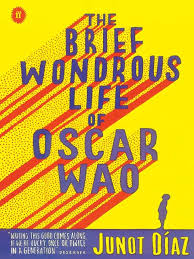Reed Books: The Brief Wondrous Life of Oscar Wao
May 21, 2020
The Brief Wondrous Life of Oscar Wao by Junot Díaz is a powerful book of prose that follows the life of Oscar De Leon, an overweight, bullied nerd living in New Jersey in the ‘80s, and the lives of those around him.
While this novel could easily fall into a classic nerdy trope, Díaz takes a different route by occasionally jumping back in time to stories of Oscar’s family in the Dominican Republic, before and after Trujillo (a ruthless dictator) is in office. A few chapters are dedicated to Oscar’s mother, Beli, and her experience as a teenage girl in the D.R. at this time. After getting pregnant by the husband of Trujillo’s sister, she is targeted and nearly killed, but flees to the U.S.. Similarly, we learn that Oscar’s grandfather, Abelard, said something derogatory towards Trujillo to a few friends at the time, and found himself locked in prison for life.
jumping back in time to stories of Oscar’s family in the Dominican Republic, before and after Trujillo (a ruthless dictator) is in office. A few chapters are dedicated to Oscar’s mother, Beli, and her experience as a teenage girl in the D.R. at this time. After getting pregnant by the husband of Trujillo’s sister, she is targeted and nearly killed, but flees to the U.S.. Similarly, we learn that Oscar’s grandfather, Abelard, said something derogatory towards Trujillo to a few friends at the time, and found himself locked in prison for life.
The fascinating part of the The Brief Wondrous Life of Oscar Wao is that while it certainly spends its time on Beli, Abelard, and other members of Oscar’s family, Oscar is still clearly the protagonist, despite not having grown up in the Dominican Republic. The reason that Díaz focuses on such a stagnant character despite having more compelling stories surrounding him is to drive home one of the themes of the novel; the daily effects of political corruption and war. It’s easy to get swept up in every move of the higher-ups during a political crisis, but the real life stories of average citizens often go untold. Of course, Oscar feels the effects of the Era of Trujillo at the end of the novel – after going to the D.R. to visit family, he falls in love with one of their neighbors, who is unfortunately dating a powerful police officer who used to be connected to Trujillo. When her boyfriend discovers their friendship, he sends two cronies after Oscar to kill him. They succeed the second time.
Overall, The Brief Wondrous Life of Oscar Wao by Junot Díaz is strong in both its content and its form, nailing home the sweetness and beauty of lives colored in tragedy. The novel does not drag on, and is never pretentious, but does a nice job handling the heavy political culture of the time, and the day-to-day effects an evil dictator can have on real people.
















































